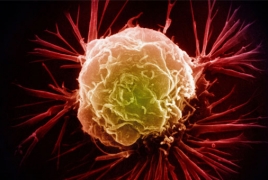Wearable device captures cancer cells from blood April 1, 2019 - 14:00 AMT PanARMENIAN.Net - A prototype wearable device, tested in animal models, can continuously collect live cancer cells directly from a patient's blood, Medical Xpress says. Developed by a team of engineers and doctors at the University of Michigan, it could help doctors diagnose and treat cancer more effectively. "Nobody wants to have a biopsy. If we could get enough cancer cells from the blood, we could use them to learn about the tumor biology and direct care for the patients. That's the excitement of why we're doing this," says Daniel F. Hayes, M.D., the Stuart B. Padnos Professor of Breast Cancer Research at the University of Michigan Rogel Cancer Center and senior author on the paper in Nature Communications. Tumors can release more than 1,000 cancer cells into the bloodstream in a single minute. Current methods of capturing cancer cells from blood rely on samples from the patient—usually no more than a tablespoon taken in a single draw. Some blood draws come back with no cancer cells, even in patients with advanced cancer, and a typical sample contains no more than 10 cancer cells. Over a couple of hours in the hospital, the new device could continuously capture cancer cells directly from the vein, screening much larger volumes of a patient's blood. In animal tests, the cell-grabbing chip in the wearable device trapped 3.5 times as many cancer cells per milliliter of blood as it did running samples collected by blood draw. "It's the difference between having a security camera that takes a snapshot of a door every five minutes or takes a video. If an intruder enters between the snapshots, you wouldn't know about it," says Sunitha Nagrath, Ph.D., associate professor of chemical engineering at U-M, who led the development of the device. Research shows that most cancer cells can't survive in the bloodstream, but those that do are more likely to start a new tumor. Typically, it is these satellite tumors, called metastases, that are deadly, rather than the original tumor. This means, cancer cells captured from blood could provide better information for planning treatments than those from a conventional biopsy. The team tested the device in dogs at the Colorado State University's Flint Animal Cancer Center in collaboration with Douglas Thamm, VMD, a professor of veterinary oncology and director of clinical research there. They injected healthy adult animals with human cancer cells, which are eliminated by the dogs' immune systems over the course of a few hours with no lasting effects. Authorities said a total of 192 Azerbaijani troops were killed and 511 were wounded during Azerbaijan’s offensive. In 2023, the Azerbaijani government will increase the country’s defense budget by more than 1.1 billion manats ($650 million). The bill, published on Monday, is designed to "eliminate the shortcomings of an unreasonably broad interpretation of the key concept of "compatriot". The earthquake caused a temporary blackout, damaged many buildings and closed a number of rural roads. Partner news |